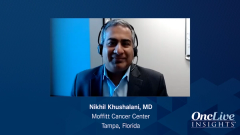
Treating Patients with High-Risk Melanoma
A comprehensive overview of treatment approaches for patients with high-risk melanoma.
Episodes in this series

Transcript:
Sunandana Chandra, MD, MS: Talk briefly about patients with high-risk melanoma. For example, for patients with stage III melanoma, a number of trials have led to approvals initially of high-dose ipilimumab and anti–PD-1, as well as combination BRAF/MEK for those who have a BRAF mutation. For a patient with stage III disease, Dr Khushalani, when do you decide to treat and with what agent, especially if they’re BRAF mutated?
Nikhil Khushalani, MD: Great question. All patients with stage III and resected stage IV disease in our multidisciplinary practice are referred to medical oncology. This includes stage IIIA disease as well as stage IIIB. Of course, we rarely see any stage IIIBs anymore. All of them deserve a discussion with medical oncology about the pros and cons of adjuvant therapy. As you pointed out, there are 3 approved regimens in use.
Ipilimumab is appropriate if this were 5 years ago. High-dose interferon was also appropriate 5 years ago. But I wouldn’t consider any of those to be standards of care as frontline adjuvant regimens right now. I don’t think they should be used at all. It needs to be single-agent pembrolizumab, single-agent nivolumab, or a combination dabrafenib-trametinib for the patient who is BRAF mutated.
Patients with stage IIIB, IIIC, and IIID should routinely get adjuvant therapy regardless of BRAF status. If they’re BRAF mutated, my bias tends to be utilizing targeted therapy for those patients. That’s purely my bias. As you know, there’s no head-to-head comparison between these 2 in the adjuvant setting, but if one extrapolates the data, the risk reduction is relatively similar and the COMBI-AD adjuvant study with dabrafenib-trametinib demonstrated long-term relapse-free survival as well as overall survivorship in a very well conducted phase 3 trial. In those patients, my bias is strongly adjuvant targeted therapy because if these patients were to go on and relapse, I still feel confident that immunotherapy in that frontline setting for metastatic disease can potentially still lead to durable disease control.
I’m not as confident of the reverse. In other words, if patients are on adjuvant anti–PD-1 monotherapy and failing treatment, are they considered anti–PD-1 primary refractory even if they occur within a certain period of time after completion of adjuvant therapy or longer than 6 months? Those patients tend to do worse when you try to salvage them with combination immunotherapy or targeted-therapy options in a metastatic setting. We need more data to back up that claim, but that tends to be my strong bias. When it comes to stage IIIA disease, there’s more of a discussion. Stage IIIA does have a risk for recurrence, and this should be discussed on a case-by-case basis. I offer this to my patients in that setting as well, but I look at comorbidities, the age of the patient, their general medical condition, and other autoimmune conditions to make decisions about whether to treat those patients.
Sunandana Chandra, MD, MS: To clarify, some of the adjuvant trials did not include stage IIIA. If they did, they required a greater than 1-mm focus of melanoma in the lymph node. Dr Pavlick, for a patient with stage IIB or IIC melanoma, based on the KEYNOTE-716 data, how do you manage these patients in your practice?
Anna C. Pavlick, DO: First, they need to make it to a medical oncologist. Many times, patients with stage IIB and IIC disease don’t even get referred to medical oncology from the dermatologist. Because there are more data to say that adjuvant therapy may improve outcome, we’re starting to see more of those patients, but I don’t see a great number of them. Patients with stage IIC disease are probably in a worse predicament than patients with stage IIIA disease, so we owe it to patients to have an informed conversation with them, talking about their high-risk disease, potential adverse effects, and risk reduction. At this point, we may not have a significant impact on survival because the data haven’t been out there long enough, but patients need to know that this is available. There are trials that are being offered to patients in the adjuvant setting for stage II, stage III, and resected stage IV disease. That would always be my bias. Put them on a clinical trial so we know [more] and can accumulate more data to say how these patients do in the long term because they’re being followed so closely.
Transcript edited for clarity.








































